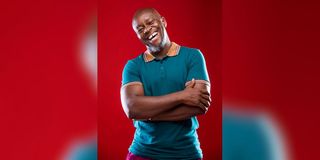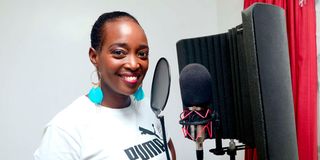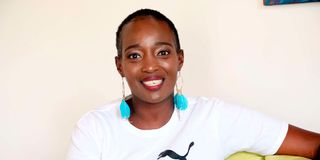
From left: Yafesi Musoke, Manya Nyamweya and Peter Kaylo.
Over the past few decades, the Kenya voice acting landscape has undergone a remarkable transformation, from a low-paying radio entertainment-only art to the present day where diverse and dynamic opportunities abound.
Peter Kyalo is among artistes who have carved a niche for themselves.
Growing up, Peter liked mimicking people. There was an animated quality to his voice.
"I would pick up newspapers and read aloud like a news anchor. Those moments that showed me there was something about my voice. I was also a good orator," he says.

Peter Kaylo gestures during the interview at his home in Langata, Nairobi on June 5, 2024.
His journey to voice acting was not easy. "I went to several media houses for voice casting but kept failing," says Peter who did not give up.
Shortly after, he was picked to make announcements in his church, giving him a stage to demonstrate his skills.
"After a few months, I was invited to do a demo for the church radio station. I was chosen to be the station's voice. We would work for three days straight to get everything in place," says Peter, now a preacher.
While working as a radio presenter, his voice became so popular that agencies sought him to do commercials.

Peter Kaylo during the interview at his home in Langata, Nairobi on June 5, 2024.
One of the popular commercials Peter did was for a telecommunication company advertising its internet packages.
"I did the first Faiba TV advert for Jamii Telecommunications Limited. While I was voicing the script, it didn't come out exactly the way they wanted it to," Peter says.
The production team had to come up with a better way to make the ad more interesting.
"I was in the voice booth and remembered an incident from a while ago, so I imitated the accent. I did it using the words in the script and that was it. We forgot the plan and went with the accented script," he adds.
'Hey, mboss' advert
The line 'Hey, mboss' in the advert became a big thing in the city.
‘The Faiba advert blew up because of the Kamba accent. Faiba became a big brand 11 years ago because of that particular character. They even animated the character with a beard to look like me," he laughs and adds, "I still did the voice of the announcer in the project."
'Mawowowo' advert
Just like Peter, when asked about his career-defining moment, Yafesi Musoke, a creative consultant and a screenwriter laughs and takes a deep breath.
Then he says, "Wueh! There have been a couple, but 'Mawowowo', the Ilara Milk ad, is the most viral advert I have ever done. More than six years later, people still recognise me because of it," he says.

Yafesi Musoke is a screenwriter, TV show host, actor, emcee and voice artiste.
He recalls an incident when a pastor approached him and asked him to jump on a table just so he could tell his family he met Yafesi.
"I think a selfie would have worked better, and no, I did not jump on the table. There was cake," he laughs.
Yafesi’s first professional gig was 27 years ago, a radio commercial for a soft drink brand, for which he was paid Sh500. He was a student.
Highest pay
Lifestyle asked about his highest pay, and he said, "The highest I have ever been paid for a single voice recording session was Sh350,000. I have been blessed to have that happen more than once."
Are there habits that a voice-over artist should not indulge in to maintain his or her voice?

Yafesi Musoke is a screenwriter, TV show host, actor, emcee and voice artiste.
"I can’t stress enough how much I don’t enjoy shouting. Also, avoid overindulgence in anything, especially sugar. I have a weakness for chocolate and I try to limit myself to roughly half a bar of chocolate (40g) in a month, which is difficult. Also, as a side note, don’t eat peanuts before recording your voice. Just don’t," Yafesi cautions.
Industry skills
Voice-over skills are so unique that even established actors find it difficult to master. It takes versatility, imagination and more than a little practice to do a wide range of voices for advertising jingles, films and more.
Manya Nyamweya doesn't remember exactly when she started using her voice professionally, but she's certain it was over a decade ago.

Manya Nyamweya a voice over artists during the interview at her Kitisuru home in Nairobi on June 10, 2024.
"I kept getting compliments from people telling me that I should consider doing voiceovers. After my first audition for a radio commercial, I got the job the same day. I have also done different advertisement campaigns which varies because every other day it’s a different script that you are learning your voice to," she says.
Nivea commercials
Manya is currently the Interactive Voice Response (IVR) of Telkom Kenya, she is also the voice behind most of the Nivea commercials.
"Sometimes I meet people and my voice is familiar because it’s always on rotation so they can easily tell. I also do athletics commentary where I commentate on track and field," she says.
She prefers doing voice-overs during mid-morning when her voice is not tired.
"When it comes to lifestyle habits I don’t have exclusive habits such that I have had to kick to the curb," she says.

Manya Nyamweya a voice over artists during the interview at her Kitisuru home in Nairobi on June 10, 2024.
Manya has a home recording studio where she primarily works, allowing her to collaborate with others worldwide without the need to travel.
Although she occasionally heads into an external studio to record, she says her home setup provides a significant advantage.
When it comes to payments, the value of voice work is often determined by the hiring company. However, being considered premium talent means a voice artist stands to earn good money.
Miss Manya laughs in response to the question about her pay. She is reluctant to reveal a specific amount, but says, "A good gig could pay me between Sh50,000 to Sh150,000 since I do voice for both Kiswahili and English."
Peter, also confirms that the highest he has earned is hundreds of thousands of shillings.
"Voice art is more of a passive income career although for the long-term contracts, you can be lucky to cross the Sh1 million mark," he adds.
Regulation gap
Yafesi however, notes the values can be subjective, "There are rate cards for voice actors in Kenya as a guide, but it has been difficult to structure the industry in terms of regulations involving usage of the voice and buy-out periods, and other technical terms. As it stands the value is determined by what agencies or production houses present to the companies, measured against the company’s budget, or Finance Department’s mood, whichever comes first."
In developed countries, voice-over artists insure their voices as their tools of trade. For Peter, Manya and Yafesi, however, they can only hope that the local industry will develop to such levels.
"I leave that to Morgan Freeman (Hollywood actor). I don’t even know you can do that here," Yafesi laughs.
The challenges
Clients often struggle to articulate their needs, leading artists to re-record multiple times in a single session. This can strain their voices and require several costly and frustrating trips back to the studio.
As a result, payments are often delayed leaving artists to lament the difficulties they face despite their efficiency.
"If I can record in 10 or 20 minutes instead of two hours, it can't be that hard, can it? But the reason it takes me less time is because I've been doing it for over two decades, not because it's easy," Yafesi adds.





